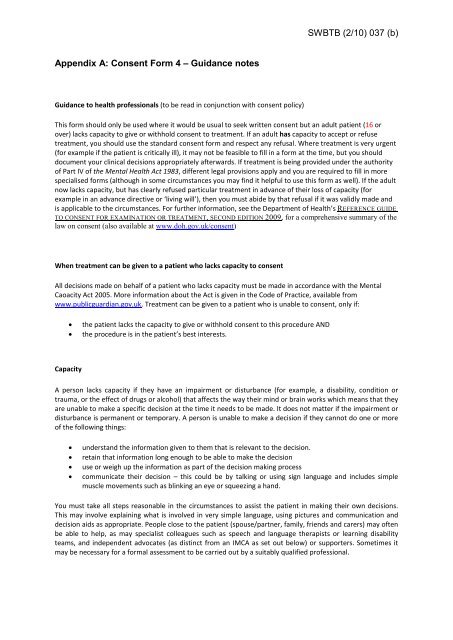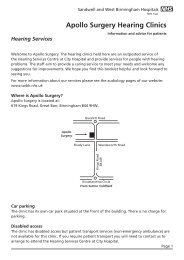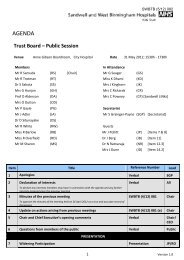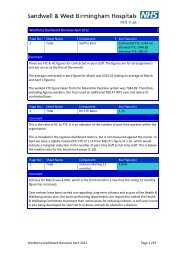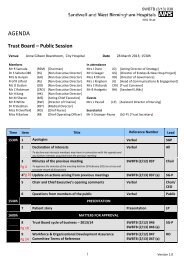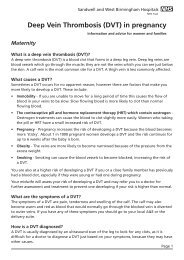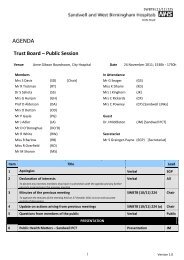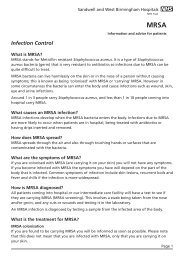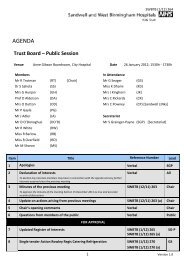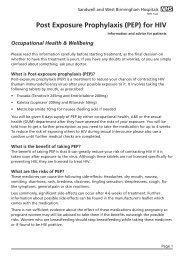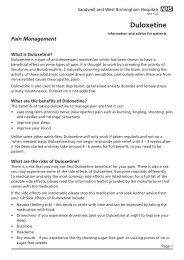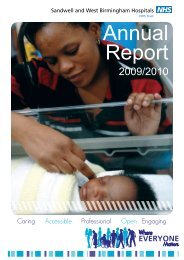Trust Board Febuary 2010 - Sandwell & West Birmingham Hospitals
Trust Board Febuary 2010 - Sandwell & West Birmingham Hospitals
Trust Board Febuary 2010 - Sandwell & West Birmingham Hospitals
Create successful ePaper yourself
Turn your PDF publications into a flip-book with our unique Google optimized e-Paper software.
SWBTB (2/10) 037 (b)<br />
Appendix A: Consent Form 4 – Guidance notes<br />
Guidance to health professionals (to be read in conjunction with consent policy)<br />
This form should only be used where it would be usual to seek written consent but an adult patient (16 or<br />
over) lacks capacity to give or withhold consent to treatment. If an adult has capacity to accept or refuse<br />
treatment, you should use the standard consent form and respect any refusal. Where treatment is very urgent<br />
(for example if the patient is critically ill), it may not be feasible to fill in a form at the time, but you should<br />
document your clinical decisions appropriately afterwards. If treatment is being provided under the authority<br />
of Part IV of the Mental Health Act 1983, different legal provisions apply and you are required to fill in more<br />
specialised forms (although in some circumstances you may find it helpful to use this form as well). If the adult<br />
now lacks capacity, but has clearly refused particular treatment in advance of their loss of capacity (for<br />
example in an advance directive or ‘living will’), then you must abide by that refusal if it was validly made and<br />
is applicable to the circumstances. For further information, see the Department of Health’s REFERENCE GUIDE<br />
TO CONSENT FOR EXAMINATION OR TREATMENT, SECOND EDITION 2009, for a comprehensive summary of the<br />
law on consent (also available at www.doh.gov.uk/consent)<br />
When treatment can be given to a patient who lacks capacity to consent<br />
All decisions made on behalf of a patient who lacks capacity must be made in accordance with the Mental<br />
Caoacity Act 2005. More information about the Act is given in the Code of Practice, available from<br />
www.publicguardian.gov.uk. Treatment can be given to a patient who is unable to consent, only if:<br />
• the patient lacks the capacity to give or withhold consent to this procedure AND<br />
• the procedure is in the patient’s best interests.<br />
Capacity<br />
A person lacks capacity if they have an impairment or disturbance (for example, a disability, condition or<br />
trauma, or the effect of drugs or alcohol) that affects the way their mind or brain works which means that they<br />
are unable to make a specific decision at the time it needs to be made. It does not matter if the impairment or<br />
disturbance is permanent or temporary. A person is unable to make a decision if they cannot do one or more<br />
of the following things:<br />
• understand the information given to them that is relevant to the decision.<br />
• retain that information long enough to be able to make the decision<br />
• use or weigh up the information as part of the decision making process<br />
• communicate their decision – this could be by talking or using sign language and includes simple<br />
muscle movements such as blinking an eye or squeezing a hand.<br />
You must take all steps reasonable in the circumstances to assist the patient in making their own decisions.<br />
This may involve explaining what is involved in very simple language, using pictures and communication and<br />
decision aids as appropriate. People close to the patient (spouse/partner, family, friends and carers) may often<br />
be able to help, as may specialist colleagues such as speech and language therapists or learning disability<br />
teams, and independent advocates (as distinct from an IMCA as set out below) or supporters. Sometimes it<br />
may be necessary for a formal assessment to be carried out by a suitably qualified professional.


